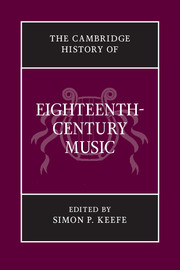Book contents
- Frontmatter
- PRELUDE
- PART I MUSIC FOR THE CHURCH
- INTERLUDE
- PART II MUSIC FOR THE THEATRE
- 8 Italian opera in the eighteenth century
- 9 Opera in Paris from Campra to Rameau
- 10 An instinct for parody and a spirit for revolution: Parisian opera, 1752–1800
- 11 German opera from Reinhard Keiser to Peter Winter
- 12 The lure of aria, procession and spectacle: opera in eighteenth-century London
- 13 Music theatre in Spain
- 14 Opera in Sweden
- INTERLUDE
- PART III MUSIC FOR THE SALON AND CONCERT ROOM
- POSTLUDE
- Appendix I Chronology
- Appendix II Institutions in major European cities
- Appendix III Personalia
- Index
- References
14 - Opera in Sweden
from PART II - MUSIC FOR THE THEATRE
Published online by Cambridge University Press: 28 March 2011
- Frontmatter
- PRELUDE
- PART I MUSIC FOR THE CHURCH
- INTERLUDE
- PART II MUSIC FOR THE THEATRE
- 8 Italian opera in the eighteenth century
- 9 Opera in Paris from Campra to Rameau
- 10 An instinct for parody and a spirit for revolution: Parisian opera, 1752–1800
- 11 German opera from Reinhard Keiser to Peter Winter
- 12 The lure of aria, procession and spectacle: opera in eighteenth-century London
- 13 Music theatre in Spain
- 14 Opera in Sweden
- INTERLUDE
- PART III MUSIC FOR THE SALON AND CONCERT ROOM
- POSTLUDE
- Appendix I Chronology
- Appendix II Institutions in major European cities
- Appendix III Personalia
- Index
- References
Summary
Interest in music as an art-form increased steadily in Sweden during the eighteenth century. In the 1730s public concerts were given for the first time in Stockholm by the orchestra of the royal court (the only professional orchestra in eighteenth-century Sweden), reinforced by amateur aristocratic performers under the leadership of the Kapellmeister and composer Johan Helmich Roman (1694–1758), known as ‘the Father of Swedish Music’. In the 1760s the society Utile Dulci was founded in Stockholm and included a specialized music department counting among its members many amateur musicians, mostly noblemen and others from the upper classes. In the 1770s the Royal Academy of Music and the Gustavian Opera were founded (1771 and 1773, respectively). All these developments contributed to a new demand for music both inside and outside professional circles and led to a strong interest in contemporary music – the music of Carl Friedrich Abel, Christoph Willibald Gluck, André-Ernest-Modeste Grétry, Carl Heinrich Graun, Johann Adolph Hasse, Joseph Haydn, Franz Anton Hoffmeister, Johann Stamitz and others was soon introduced to Swedish audiences.
We can identify two principal periods of musical activity in eighteenth-century Sweden. The first was the so-called ‘Age of Freedom’ (Frihetstiden, 1720–70); Johan Helmich Roman served as Kapellmeister for the majority of this period. Virtually no musical repertory survives, even though it is known that Roman travelled extensively in order to purchase music. The second (1770–92), referred to as the ‘Gustavian period’ on account of Gustavus III’s reign, is represented mainly by Gustavian Opera, a kind of national opera project. Composers mostly from abroad came to be associated with it, including Johann Gottlieb Naumann (1741–1801), Joseph Martin Kraus (1756–92), Georg Joseph (‘Abbé’) Vogler (1749–1814) and Johann Christian Friedrich Haeffner (1759–1833).
- Type
- Chapter
- Information
- The Cambridge History of Eighteenth-Century Music , pp. 420 - 432Publisher: Cambridge University PressPrint publication year: 2009



